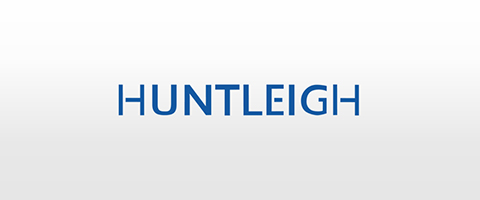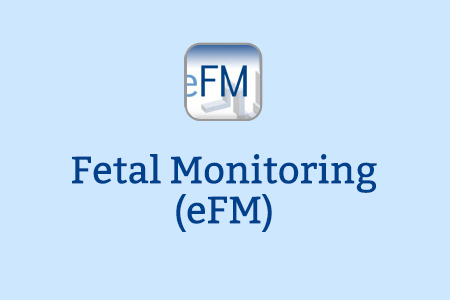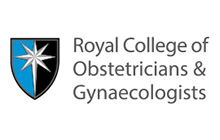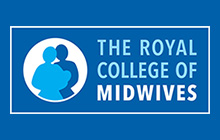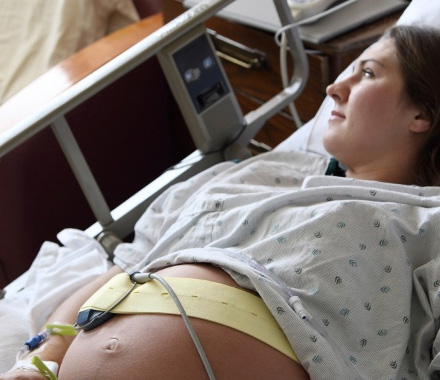About the Fetal Monitoring programme
eFM is a comprehensive web-based resource developed by the Royal College of Obstetricians and Gynaecologists and the Royal College of Midwives in partnership with Health Education England elearning for healthcare.
eFM will teach and assess learners in all aspects of intrapartum fetal monitoring and is directed at both obstetricians and midwives in training as well as those who have completed their training. eFM is split into two sections:
- Four learning paths, consisting of knowledge-based, interactive tutorials, based on levels of complexity. Each learning path contains summative assessment, with a pass mark of 80% needed to progress to the following learning path’s assessment
- A case study section which allows the learner to practise their skills at interpretation of an actual fetal heart rate recording, and the subsequent management in a virtual labour ward setting. The challenging nature of the content, including the interpretation of cardiotocographs and subsequent appropriate management, will provide learners with valuable knowledge that does not currently exist in other resources. This section is separated into ‘Test’ and ‘Learning’ case studies. Test case studies are to be worked through 1 trace hour at a time and will carry CPD points and certification. ‘Learning’ case studies have been designed with a ‘freedom of movement’ throughout the case study, enabling users to discuss and debate any point or trace hour, at any time. They will be designed to ignite discussion and will be a great addition to the classroom/lecture theatre as well as study groups. Learning case studies will not benefit from CPD points as there will be no scoring attached to these.
About the case studies
eFM currently has 27 case studies, all of which have been developed, and updated in accordance with the 2017 NICE guidelines update. Three or more expert opinions have populated the clinical cases with their answers. Answers can now be collated and scored to give a final % score, to allow for CPD points (‘Test’ case studies only). Users are allowed as many attempts as they like to improve their score. ‘Learning’ case studies have also been created to provide a foundation for debate and classroom discussion. These will not carry CPD points.
More information
Obstetricians and midwives, both those training and those who have completed their training are required to independently interpret cardiotocographs (CTGs) in the crucial lead up to birth.
eFM educates learners using assessment-driven, case-based learning. Interactive learning sessions will test knowledge of CTG interpretation and clinical management, and will provide feedback to the learner regarding their performance. This feedback is based on the collective responses of three experts.
eFM teaches and assesses by mirroring real-life cases and situations. Learners will evaluate, interpret and reflect on a variety of situations presented, with the aim of minimising errors in the labour ward. Learners will be able to see the results of their actions including any life threatening harm to a baby and the subsequent litigation consequences for the doctor or midwife.
Midwives and obstetricians, both those in training and those who have completed their training, will be able to assess themselves regularly and apply their knowledge in the same way they do in real-life situations. The Royal College of Obstetricians and Gynaecologists (RCOG) will add 60 cases every five years in order to reflect the continuing professional development cycle. Evidence of achievement can be used for recertification of healthcare professionals by the RCOG, the RCM and the Nursing and Midwifery Council (NMC).
Course information
-
Course 1
Background and Practical IssuesCourse 1
Background and Practical Issues
This course has six sessions covering:
- History of fetal heart rate (FHR) monitoring, the importance of intrapartum (IP) fetal hypoxia and using the FHR as a screen for IP fetal hypoxia
- Indications for continuous electronic FHR monitoring (EFM) in labour (risk for fetal hypoxia) and the role of admissions test
- A review of the evidence of the value of EFM in terms of maternal, fetal and neonatal outcomes
- Antenatal Computerised CTG, Intermittent Auscultation, and ST-analyser
-
Course 2
Care in Normal LabourCourse 2
Care in Normal Labour
This course has two sessions covering:
- Care of women
- Appropriate fetal monitoring in women at low risk for IP fetal hypoxia
-
Course 3
Normal and Non-normal CTGsCourse 3
Normal and Non-normal CTGs
This course has six sessions covering:
- The normal CTG (control, terminology, definitons; basic interpretation)
- The impact of IP fetal hypoxia on the FHR (split into two sessions)
- More complicated FHR traces (e.g. sinusoidal)
- Interpretation in special circumstances (e.g. breech, preterm, multiple pregnancy) (split into two sessions)
-
Course 4
Management IssuesCourse 4
Management Issues
This course has four sessions covering:
- Labour interventions that can affect the FHR (e.g. oxytocics, medication, regional analgesia)
- Interventions intended to improve the FHR (e.g. maternal postions, oxygen, reducing uterine contractions)
- Additonal tests that help clarify fetal status (e.g. fetal pH, fetal ECG)
- NICE Guidelines
-
Course 5
Education and GovernanceCourse 5
Education and Governance
This course has two sessions covering:
- Educational methods for improving EFM interpretation and management
- Risk management issues including governance and audit
-
Assessments
Assessments
This course includes 5 assessments designed to test learners’ knowledge following completion of the sessions within each of the knowledge-based courses.
-
Case Studies
Case Studies
- Case Studies 2011 – For reference purposes only
- Case Studies 2013 – For reference purposes only
- Case Studies 2015 – Released in accordance with the latest NICE guidelines
- Case Studies 2016 – To be released early 2017
- Case Studies 2017 – To be released mid/late 2017
CPD points
The Continuing Professional Development (CPD) Programme of the Royal College of Obstetricians and Gynaecologists (RCOG) has agreed that CPD credits can be earned for the online materials in the eFM programme.
A maximum of 25 RCOG CPD credits in the Knowledge-Based Assessment category (KBA) may be claimed each 5-year cycle for eFM activities. The following credits are available:
- Each assessment where you achieve the pass mark of 80% will get 2 CPD credits
- Each ‘Test’ case study, published from 2015, where you achieve a pass mark of 80% will provide 2 credits in the Knowledge Based Assessment category.
A certificate of completion ,which details your learning history, is available in pdf format for you to download or print out.
Sample sessions
eFM offers 23 knowledge based sessions, grouped into 4 learning paths, based on levels of complexity. Each session features graphics, animations, video and interactive questions. Also available, is a series of case studies, which allow the learner to practise their skills in interpretation of an actual fetal heart rate recording, and the subsequent management in a virtual labour ward setting.
An example of a knowledge based session can be found below. To work your way through this, simply click on the ‘Next’ button on the top right hand corner of each page and follow the instructions on screen.
-
The History of and Rationale for Electronic Fetal Monitoring
This session describes the history of and rationale for fetal heart rate monitoring.
Project team

Anita Hedditch
Clinical Project Lead
Scott Mountifield
Project Manager, HEE elearning for healthcare
Jo Davies
Joint Head of Education Resources, RCOG (On maternity leave)
Executive group

Martin Sinclair
Programme Lead, HEE elearning for healthcare
Gail Johnson
Professional Advisor, Education, RCM
Amanda Hutcherson
Lecturer in Midwifery, City University London
Alex Drinkall
Stakeholder Manager, HEE elearning for healthcare
Editorial team

Debbie Johnson
Senior Lecturer in Midwifery, University of Greenwich
Bode Williams
Consultant Obstetrician, Liverpool Women’s NHS Foundation Trust
Rowena Pykett
ST5 in Obstetrics & Gynaecology, East Midlands North Deanery
Bronwen Grigg
Midwife, St George's Hospital, Tooting, London
Anita Hedditch
Senior Midwife, Oxford University Hospital NHS Trust
Venkat Raman
Consultant Obstetrician and Gynaecologist, Southend University Hospitals NHS Foundation Trust
Acknowledgement
We would also like to kindly acknowledge Prof Chris Redman and Mary Moulden from John Radcliffe Hospital, Oxford for their invaluable assistance in providing CTG cases for the eFM project.
How to access
In order to access the Fetal Monitoring programme, you will need an elfh account. If you do not have one, then you can register by selecting the Register button below.
To view the Fetal Monitoring programme, select the View button below. If you already have an account with elfh, you will also be able to login and enrol on the programme from the View button.
NHS healthcare staff in England
The Fetal Monitoring programme is also available to NHS healthcare staff via the Electronic Staff Record (ESR). Accessing this elearning via ESR means that your completions will transfer with you throughout your NHS career.
Further details are available here.
Not an NHS organisation?
If you are not an NHS health or care organisation and therefore do not qualify for free access elfh Hub, you may be able to access the service by creating an OpenAthens account.
To check whether or not you qualify for free access via OpenAthens, you can view the eligibility criteria and register on the ‘OpenAthens’ portal.
Registering large numbers of users
If you are a HR, IT or Practice Manager and would like to register and enrol large numbers of staff within your organisation for access onto the Fetal Monitoring programme, please contact elfh directly.
Organisations wishing to use their own LMS
For HR departments wanting to know more about gaining access to courses using an existing Learning Management System please contact elfh directly to express interest.
How to license
In the event that you do not qualify for free access to the Fetal Monitoring programme, you are able to license access through eIntegrity, a community-interest company established for this purpose.
You can check whether or not you qualify for free access by clicking on the ‘Register’ button above.
For more information on the licensing options available for the Fetal Monitoring programme, please visit the eIntegrity website.
More information
Please select the following link for more information on how to use the elfh Hub.
Many thanks
eFM would like to acknowledge and thank Huntleigh for their ongoing support with this project.
